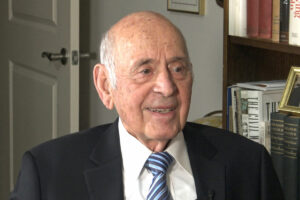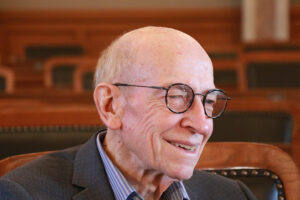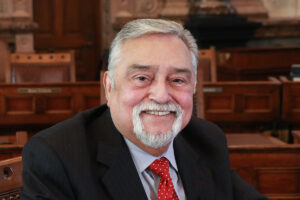Topic: Bipartisan

Interview of William (Bill) Reardon, August 2, 2019
Interviewed by Jim McLean
Bill Reardon is a story-teller, famous in the Democrat caucus for his jokes, stories and anecdotes, told with great enthusiasm. This entertaining interview is also filled with some of those stories. Reardon talks about how he was inspired by seeing John F. Kennedy in Kansas City and also by his brother and father, both political figures in Wyandotte County. There is an entertaining description of a hearing he chaired in the Federal and State Affairs committee on the Equal Rights Amendment in 1977. Reardon divides his legislative service into two periods—the bipartisan problem-solving work of the first 15 years, and Show Morea more ideologically driven, partisan era in the last fifteen years. His descriptions of developing and passing the 1992 school finance bill are consistent with other interviews of legislators serving at that time. Reardon tells stories about how leadership worked and discloses his observations about the Brownback years when he was serving as a lobbyist for the school district. He did end the interview with his story about a land turtle which was not transcribed because of its length, but if you see Reardon, ask him about the turtle story. Show Less

Interview of Bob Stephan, October 21, 2020
Interviewed by Michael (Mike) Matson
Former Attorney General Robert T. Stephan, in this 2020 oral history interview, recalls the highlights of his years serving the State of Kansas as Attorney General (1979 to 1995). Stephan's career as a champion of children as well as victims of crime and discrimination was shaped by his upbringing in Wichita and his strong sense of what it right. Stephan laments the increasingly partisan atmosphere of the National Association of Attorneys General, an organization to which he belonged during his time in state service.

Interview of Jim Maag, September 28, 2021
Interviewed by Joan Wagnon
The Kansas Oral History Project reviewed the original transcript of Dr. Burdett Loomis's interview of Representative Jim Maag and decided to recapture part of the interview on video for inclusion in a civic education series about the Kansas legislature. This videoed interview follows the original Loomis interview, asking similar questions. A transcription of the video is also posted here. In the original 2014 oral history interview, Jim Maag reflected on his service in the Kansas House of Representatives (1969-1976) including his term as Speaker pro tem (1975-1976). In this reprise of that interview, Maag's words come to life. Show MoreMaag's years in the House spanned a time of significant change and modernization of the Kansas Legislature and its processes. He provides a view into the evolution of the Legislature into a more professional organization. He comments on the bipartisan approaches to policymaking during that era when the urban-rural split affected the dynamic more often than purely partisan considerations. Maag was witness to the impact of the one person, one vote U. S. Supreme Court decision as well as the increased number of women legislators, and the reduced number of attorneys. Jim's recollections draw a vivid picture of an institution in transition. His connection with the Legislature continued in his role of legislative liaison for Governor Bennett and later as a lobbyist for the Kansas Bankers Association. Show Less

Interview of Paul Feleciano, February 11, 2022
Interviewed by Eric Sexton
Paul Feleciano served from 1972 until 2003 in the Kansas Legislature, primarily in the state Senate. During his 31 year tenure he has served on almost every committee. His interview discusses a wide range of issues including groundwater management, mental health reform, changes in the penal system, but his descriptions of the personalities of Senate leadership make that era come alive. He characterizes the men and women serving in the 1970's and 80's as giants --articulate, caring, compassionate problem solvers who would work "across the aisles" to make things happen. As the legislature moved into Show Morethe 21st Century, Feleciano notes the split in the Republican Party between conservatives and moderates became a real problem because the impact was, "they didn't want to compromise." After leaving the legislature, Feleciano was appointed to the Kansas Parole Board and served there for six years. Show Less
